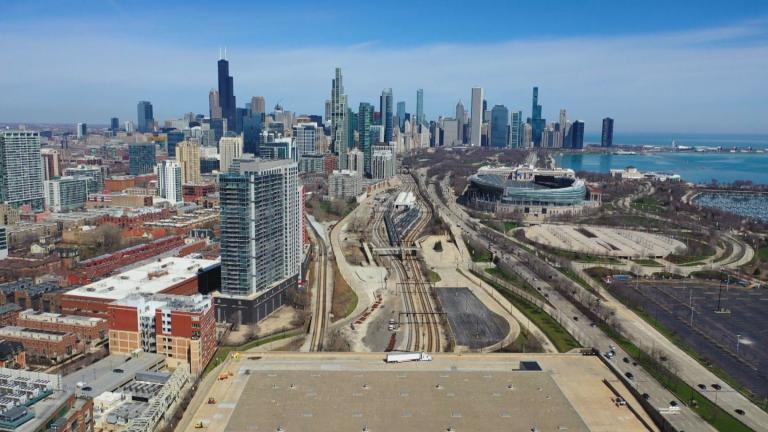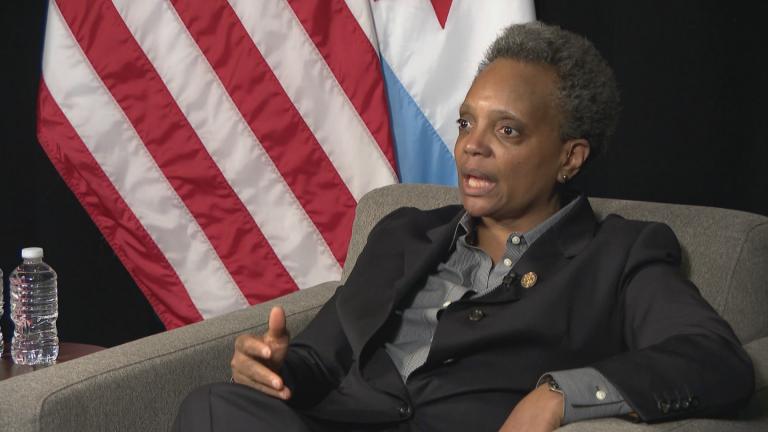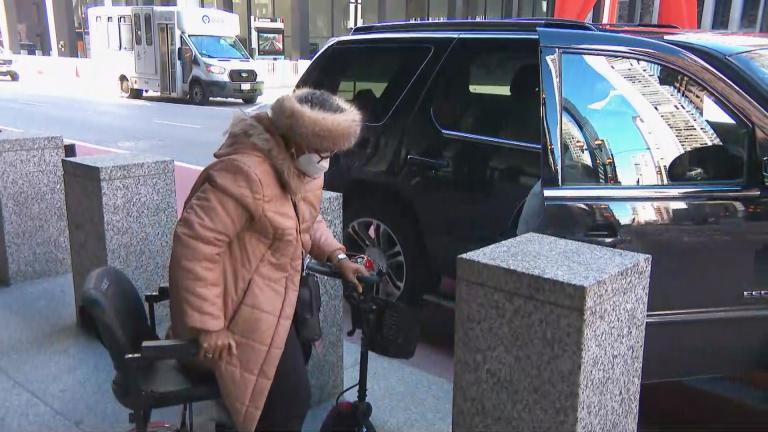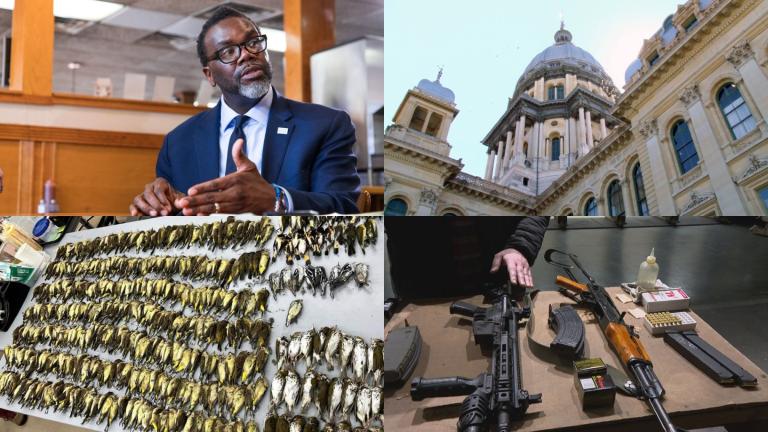Saying Chicago faces “a crisis unlike anything we have experienced in our lifetimes,” Mayor Lori Lightfoot painted a grave financial picture for the city on Monday, detailing a projected $1.2 billion budget shortfall in the 2021 fiscal year.
On top of that colossal shortfall, the city’s financial picture worsened significantly during the past three months because of an “economic catastrophe caused by the coronavirus pandemic,” Lightfoot said. The city’s budget for the current fiscal year is now $799 million in the red, she said.
Lightfoot has charged the city’s budget team with “reimagining how our government operates post COVID-19,” opening the door to layoffs — an option that the mayor said she will work to avoid.
“The reality is that life will be different for the foreseeable future, impacting how services are provided and how departments are structured, and we must adjust to meet that reality,” Lightfoot said. “Some painful choices will need to be made, including the likely necessity of personnel reductions.”
Negotiations have already begun with the labor unions that represent the city’s more than 37,000 employees, Lightfoot said.
Lightfoot declined to rule out asking the City Council to approve a property tax hike — even as many aldermen still have political scars from the 2015 vote to increase property taxes by $543 million over four years to fund police and fire pensions.
“That is one of the options we have to keep on the table,” Lightfoot said during an interview for WTTW’s “Chicago Tonight.” “That is at the very bottom at the list of options.”
Since taking office, Lightfoot has worked to restrict aldermen’s power as part of her anti-corruption efforts, and the mayor has not shied away from publicly blasting those who she considers roadblocks to her agenda in the most personal and direct terms.
During the pandemic and unrest, Lightfoot has faced frequent criticism that she has not been collaborative enough with aldermen. During her speech Monday, the mayor acknowledged their disapproval, and vowed to recalibrate her approach.
“We need to change the tone of our discourse, and no better place to start than the process we will engage in together over our fiscal future,” Lightfoot said. “And when I say ‘we,’ that includes me as well … I need to push myself harder to work with people with whom I do not agree and who do not agree with me.”
The city’s budget is also being pinched by the rising bill for the city’s pensions, officials said. In all, the city will pay its four pension funds $1.8 billion, approximately $91 million more than in 2020 from its general operating fund.
Lightfoot’s budget team said that while they had not ruled out issuing a pension obligation bond — a financial instrument that is somewhat like refinancing a mortgage at a lower rate — they would not do so unless it was coupled with structural reforms. Those reforms would have to be approved by the General Assembly, and signed into law by Gov. J.B. Pritzker, which is unlikely during an election year for many lawmakers.
Lightfoot called for federal help to ease the budget crunch, blaming the pandemic for the vast majority of the city’s shortfall, rebutting claims by President Donald Trump and Republican lawmakers that the city’s fiscal crisis is of its own making.
“The federal government must step up and support our cities and states with additional stimulus dollars critically needed by our families and businesses,” Lightfoot said. “I know this is campaign season, but this is not a red versus blue issue.”
Lightfoot also warned state officials — who are facing a massive budget deficit of their own — not to slash aid to Illinois cities and towns.
Despite the dire snapshot of the city’s finances, Chief Financial Officer Jennie Huang Bennett told reporters that the situation would be even worse had the city’s 2020 spending plan not changed the way the city operated to save $500 million.
Of the city’s projected budget shortfall of $1.2 billion in 2021, $783 million is due to the pandemic, officials said.
That leaves the city’s structural deficit — the amount that annual operating expenses outstrip annual revenues — at approximately $417 million, officials said.
Lightfoot insisted through mid-April that the city was well-prepared to weather the economic storm whipped up by COVID-19. However, the city’s finances worsened, sharply, as Pritzker extended his stay-at-home order through the end of May.
Confirmed cases of the respiratory virus are once again rising throughout Chicago and suburban Cook County.
That rise in the number of new confirmed cases of the coronavirus has meant that restaurant capacity has remained at no more than 25%, and bars that don’t serve food were forced to close, another blow to the city’s hospitality sector that has depressed tax revenue.
Five months after the coronavirus pandemic jolted every aspect of life in the United States, the spread of the disease is “not in good control in Chicago,” according to the Chicago Department of Public Health, raising the specter of additional financial pain for the city and additional illness and death.
As of Thursday, Chicago’s test positivity rate is 5.3%, according to data from the Chicago Department of Public Health. However, 7.7% of all people tested in the 24-hour period between Wednesday and Thursday had the virus, according to the data.
An average of 352 Chicagoans have been diagnosed each day with the coronavirus during the past week, a 3% increase from the previous week, according to CDPH data.
If Chicago continues to see an increase in the spread of the virus and averages more than 400 cases per day for seven days, city officials are likely to reimpose restrictions, officials said.
The city’s economy may not fully rebound until 2022 — once the pandemic is finally under control, according to the city’s forecast.
The uncertainty about the course of the coronavirus during the next several months means that budget officials do not plan to tap the city’s reserves, for fear that the city would need to have those funds available to tap during a prolonged second wave of the virus.
In addition, the city’s budget crisis has been exacerbated by two rounds of looting and civil unrest, which Lightfoot condemned in no uncertain terms.
“I say this as a Black woman, borne of parents whose life’s dreams were quickly snuffed out by the brutality of racism and segregation — no one’s life circumstances justify criminal conduct against another,” Lightfoot said. “Period.”
The city will use $350 million in federal relief funds and $100 million saved by refinancing debt last year to help close the 2020 deficit, Lightfoot said. The city expects to shave another $100 million from the 2020 deficit by refinancing additional debt, Lightfoot said.
The rest of the gap will be covered with a range of solutions, Lightfoot said.
Lightfoot is set to unveil her detailed plan to close the shortfall in October. The City Council will hold a series of hearings to scrutinize each department’s budget. The police department’s $1.7 billion budget — the largest of any city department — will likely be targeted by progressive and socialist aldermen as a way to reform policing in Chicago.
Lightfoot said she was prepared to have that discussion, but rejected the debate as “a binary choice — either fund the police or fund communities,” as a “false choice.”
“For me, the crux of this discussion around public safety funding is answering the threshold question of who is the best responder to address a community’s call for help,” Lightfoot said. “For too long, we have reflexively answered the ‘police,’ while defunding needed social services.”
Lightfoot said her team was also exploring ways to raise more revenue for the city, including hiking a personal property lease tax on computers. The city imposes a 9% tax on most leases, but only a 7% tax on computer leases.
However, the city does not plan to renew its request that the General Assembly pass a law allowing the city to hike its real estate transfer tax, as it did last year. Those revenues have taken a significant hit during the pandemic, according to the forecast.
In addition, Lightfoot said she planned to declare a large surplus to the city’s Tax Increment Financing program to help close the gap.
However, the city is not counting on any revenue from a casino to help balance the 2021 budget, even though Lightfoot asked firms last week to submit plans to build and operate a “once-in-a-generation opportunity for new gaming and entertainment development in the heart of a major American city.”
The city’s share of revenue from a casino is earmarked for its police and fire pension funds.
Contact Heather Cherone: @HeatherCherone | (773) 569-1863 | [email protected]








